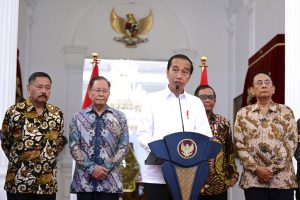Late last week, Indonesia’s President Joko Widodo signed a presidential decree restoring citizenship to people whose passports were revoked in the 1960s on suspicion of links with the country’s communist party.
According to a report by BenarNews, the decree orders the Ministry of Foreign Affairs to “verify data and provide priority services to obtain documents related to citizenship rights for victims or their heirs and people affected by serious human rights violations who are abroad.”
The order will mostly benefit the unknown number of Indonesian nationals who were living abroad or fled the country during the violent anti-communist purges of 1965-66, and subsequently had their citizenship annulled as suspected leftists. The grisly killings, which followed an apparent aborted coup attempt, targeted people with suspected or actual connections to the Indonesian Communist Party (PKI).
The policy is part of Jokowi’s surprising recent push to make amends for past cases of gross human rights violations. In January, the Indonesian leader formally acknowledged 12 episodes of historical human rights violations by government agencies between 1965 and 2003, expressing “regret” and saying that he hoped to “heal the wounds of the nation.”
The most significant of these was the 1965-66 anti-communist purges, which resulted in at least half a million deaths. The anti-communist campaign, which Geoffrey Robinson described as “one of the largest and swiftest, yet least examined instances of mass killing and incarceration in the twentieth century,” initiated the New Order of General Suharto, during which communism was proscribed, the PKI was banned (along with Marxist theory writ large), and hundreds of thousands were imprisoned without charge, some for decades.
The New Order government also severely limited the basic political rights of these tapol (political detainees), which persisted long after their release. Those Indonesians who lived abroad at the time of the coup and were suspected of having leftist sympathies had their Indonesian citizenship revoked and were prohibited from returning home. (Vincent Bevins interviewed a number of these exiles in “The Jakarta Method,” his excellent global history of the Indonesian anti-communist violence of the mid-1960s.)
The total number of exiles from this period remains unknown, but BenarNews cited one historian as saying that there were “possibly thousands” of Indonesians still living in places as far-flung as the Netherlands, China, Cuba, Albania, France, and Russia.
The citizenship restoration policy was first announced in January, when the government pledged that exiles were “Indonesian citizens who have the same rights” as others, in the words of Mahfud MD, the coordinating minister for political, legal, and security affairs. “Those who now live overseas should also get the same message, and this again shows that we are serious,” he added.
The government also announced that Jokowi had requested Foreign Minister Retno Marsudi and Law and Human Rights Minister Yasonna Laoly to arrange the meeting with the exiles somewhere in Europe. As the Jakarta Post noted, the meeting, should it take place, would be the first between the 1965 political exiles and a sitting president.
The Jokowi administration’s push to address past rights abuses has prompted widely divergent reactions. Some have hailed the acknowledgment by the president as an important symbolic recognition of past wrongs that lays a foundation for future progress, while others have argued that by ruling out judicial accountability (in large part because it might well indict senior officials in the government and military), the government has closed off any avenue for justice while occluding the rights abuses that continue to be committed by the state in places like Papua.
Similarly, while the move to restore the rights of exiles is to be acknowledged and applauded, many of the anti-communist policies of the New Order remain on the books, most notably the Provisional People’s Consultative Assembly Decree No. XXV/1966, which prohibits any propaganda promoting Marxism-Leninism. As the Jakarta Post wrote in a 2019 editorial, “The demise of the New Order may have dismantled the state surveillance mechanism, but the legal foundation to demonize anything leftist remains.”
For these reasons, Tom Iljas, an Indonesian exile who lives in Stockholm, told BenarNews that he did not trust the government’s assurances that it was genuinely prepared to confront the legacies of the Cold War.
“As long as there are discriminatory rules, the decree still exists and security is not guaranteed,” Iljas told the publication. “If there is no security protection yet, why would those who are offered citizenship want to return to Indonesia?”
































